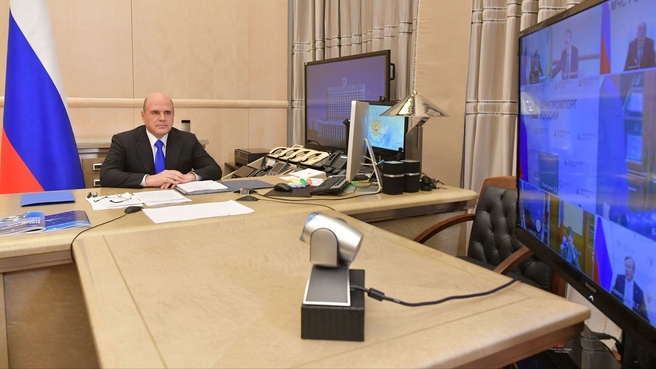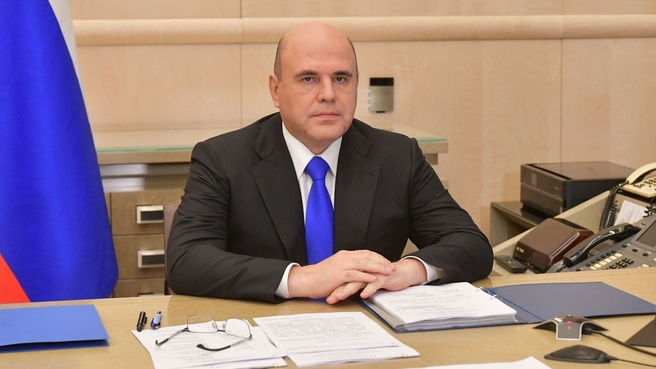The agenda includes the gas infrastructure development, state support for key projects in aircraft engine production, reduction of administrative load on SMEs, support for agriculture, and improvement of legislation on horticultural land plots.
Mikhail Mishustin’s opening remarks:
Good afternoon, colleagues,
Before we get down to our agenda, let me say a few words about the decisions we have made.
The Government has extended the list of therapeutic nutrition for children with rare (orphan) diseases. Starting from 1 January, 2022, it will include eight more items, bringing the total to 94. All these are the products required by young patients with health restrictions. They are issued free of charge when prescribed, and every child in need must receive them in a timely manner.
I would like to ask heads of the regions to carefully monitor this.
Let us get down to today’s agenda. We will begin with connecting communities to the gas network. This is an issue that concerns a lot of people in our country. In particular, we discussed it during our trips to the regions. It creates an opportunity to bring people’s living conditions to a new quality level and, of course, introduce up-to-date technologies and equipment, which will generally produce a favourable effect on the development of the economy in the medium and long term.
The President has set a range of tasks in this sphere, including the extension of the gas network to the borders of people’s land plots free of charge.
The government pays special attention to this. The main thing is that we have changed our approach to the gas supply issue. The agencies that must synchronise the actions of businesses and regions have been determined. In most of the Russian regions, this is a single gas supply operator, or regional operators in the rest.
The application procedure is now significantly simpler and can be done remotely, via the public services website, multifunctional centres, and websites of gas organisations. The necessary legislative base has been created. The connection deadlines for households as well as for small businesses have been brought forward. It is possible to apply for a comprehensive turnkey service at government-regulated rates.
About half a million applications were filed by mid-December, which is twice as high as last year.
We hope that in the end the conditions in almost three million private houses will be improved significantly, which will serve to bolster the general speed of gas supply network development in Russia. Today this indicator exceeds 72 percent.
It is extremely important to continue lowering the costs of designing and building gas pipelines as well as fast-tracking the procedures for installing them and putting them into operation, as well as registering them, so that people and businesses would be able to get access to this source of heat and energy even sooner. This is very important for ensuring good living standards for households and continuous operation of enterprises.
The Government’s agenda includes another important item, namely, state support for key projects in the field of aircraft engine manufacturing. We discussed this in great detail last week while visiting a production facility in Perm.
I am talking about a unique high-thrust engine for wide-body passenger airliners and super-heavy cargo aircraft. The engine features cutting-edge technologies, innovative solutions and new materials. Russia has never developed anything like this in the past.
Following the President’s instruction, we will allocate over 44 billion roubles today for financing the high-priority project to develop the advanced PD-35 aircraft engine. The project is implemented under the state programme Aviation Industry Development.
Mr Manturov (addressing Denis Manturov), it is important that a demonstration version of the new PD-35 engine is completely developed and manufactured in the next three years, as we have agreed. Please do everything necessary to this end.
Mr Borisov (addressing Yury Borisov), I would like to ask you to personally oversee this matter.
The next topic deals with small and medium-sized businesses, as well as socially oriented non-profit organisations. Quite often, inexperienced entrepreneurs operate in these fields. They don’t always have specialists closely monitoring the introduction of new regulations.
This is why they make mistakes. For example, they fail to comply with work safety and labour legislation requirements, and they are fined accordingly.
We will amend the Code of Administrative Offences in order to mitigate these measures for small and medium-sized businesses. We have discussed this in great detail at a meeting of the Government Commission on the Development of Small and Medium-Sized Businesses.
Warnings should be the only punishment for initial violations. Naturally, this does not include cases when people’s health has been impaired, property damaged or any other similar actions. Fines will be halved for micro and small companies, as well as socially oriented non-profit organisations, and this will help mitigate punishment for the most widespread offences.
These decisions will make it possible to reduce the administrative burden on small companies, and will help them assert themselves, gain experience and make fewer mistakes while complying with various norms in the future.
Now about supporting agriculture. As the President noted, our producers have every opportunity to saturate the domestic market and take leading positions in the world. In order to keep this sector of the economy modern, competitive and efficient, we continue to improve its infrastructure.
Today, we will allocate over 1 billion roubles to 10 Russian regions to reimburse part of the costs for building and upgrading agricultural facilities. The funds will allow for opening dairy farms and completing the construction of breeding and seed production centres, as well as storage facilities for agricultural products. All this is necessary for agriculture development and will promote the successful work of farmers.
Today we will also consider amendments to the law on gardening and horticulture, which will improve regulation in this area and help resolve issues that are especially acute for summer home owners.
First of all, this concerns the fees that members of gardening associations pay for shared expenses. They should be calculated fairly, so that people understand where this or that sum comes from. And gardeners will still decide on their own what to take into account when calculating the fees.
The amendments also provide for expanding the list of issues that should be reviewed by the general meeting of members of an association. However, it is often quite difficult to bring people together. And it happens that some issues that need to be agreed upon remain unresolved. It is possible to reduce the number of such cases by legally securing the opportunity for gardening associations to conduct voting not only in person but also using modern technologies, online. For example, through the public services portal. Or remotely. Which is easier, more convenient and saves time. It will be possible to express your opinion promptly, without going anywhere.
We will also improve the procedure for the formation of garden plots. Now it is quite complicated. Not only is the consent of the owners of garden or vegetable garden plots required, but also an expensive site planning project should be developed. The amended law eliminates such a requirement from the mandatory ones.
And the last thing I want to say. The draft law envisages expanding the simplified procedure for the privatisation of land plots by members of liquidated non-profit associations and extending it until 1 March 2031.










